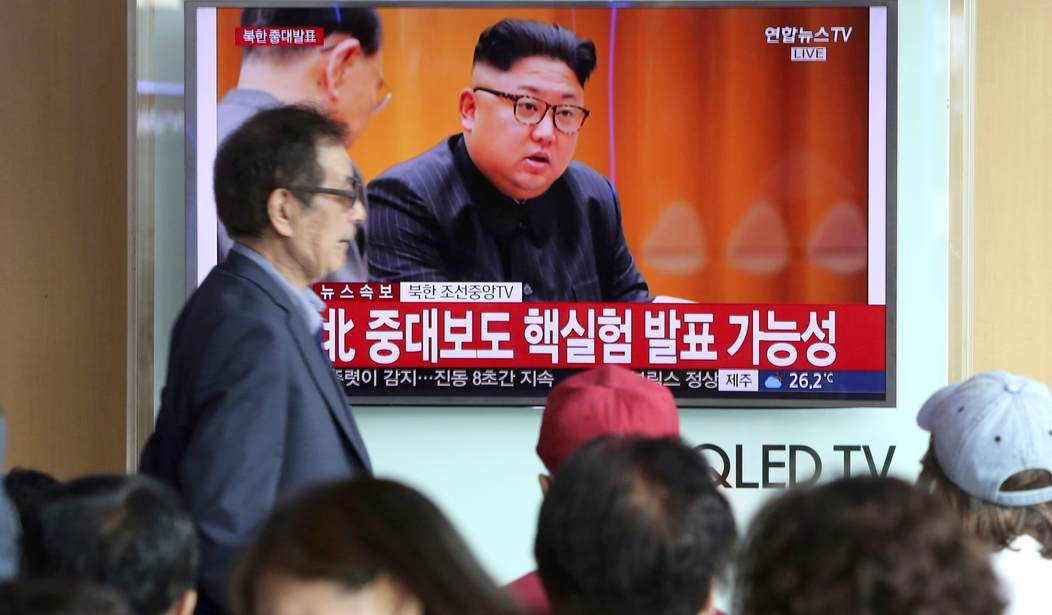Following North Korea’s sixth nuclear test, advertised by Pyongyang as an ICBM-ready hydrogen bomb, it was good to hear Defense Secretary James Mattis talking tough. But that won’t stop North Korea from building nuclear missiles. It won’t stop North Korea’s threats against the U.S. and our allies. I’d wager it won’t even interfere with Kim Jong Un’s enjoyment of his apparently ample meals.
Mattis stressed Kim’s peril in his remarks on Sunday, when he said: “Any threat to the United States or its territories, including Guam or our allies will be met with a massive military response.” Mattis added the backhanded threat that “we are not looking to the total annihilation of a country, namely, North Korea, but as I said, we have many options to do so.”
But does Kim have any reason to think the U.S. would exercise those options?
North Korea has long been a geyser of threats, including its threat last month to use the U.S. territory of Guam for missile practice, its launch last month of a ballistic missile over Japan, and its threat accompanying Sunday’s nuclear test that it could use thermonuclear weapons for a “super-powerful EMP attack.”
The U.S., Japan and South Korea have responded with shows of force, but like a multitude of displays done before, the de facto message is one of great muscle but no will to fight. None of that force has been used to strike North Korea. Kim holds Seoul hostage, and America, while groping for a solution to North Korea’s rapidly compounding threats, has no appetite to risk a replay of the carnage of the 1950-1953 Korean War, potentially amplified by nuclear weapons in the hands of Pyongyang.
With the caveat that I have no inside information, it’s intriguing to imagine what’s going on right now in Kim Jong Un’s head. He’s a young tyrant, now in his mid-thirties, who inherited power upon the death of his father, Kim Jong Il, in December 2011. Some young men inherit a family fortune. Kim inherited supremacy over a totalitarian ruling party, fully accessorized with a nation state, a gulag, a nuclear weapons program and one of the world’s largest standing armies — with artillery already dug in to threaten the fat prize of capitalist Seoul, with its population of 10 million South Koreans just the other side of the Demilitarized Zone.
Since inheriting the keys to this grotesque family estate, Kim has presided over four of North Korea’s six nuclear tests to date (one in 2013, two in 2016 and the latest this Sunday). Under his rule, North Korea has amassed a nuclear arsenal estimated by various experts to be in the double digits, perhaps now including thermonuclear weapons. On Kim Jong Un’s watch, North Korea has advertised its pursuit of the ability to launch nuclear missiles from submarines, and acquired the ability to miniaturize nuclear warheads and mount them on missiles. In July, North Korea succesfully tested two ICBMs. And, as mentioned, in August North Korea threatened the U.S. territory of Guam and launched a missile over Japan. And of course there was the test on Sunday of what North Korea celebrated as a hydrogen bomb.
From international obscurity half a dozen years ago, Kim has vaulted to erstwhile godhood on his totalitarian home turf, and become a celebrity tyrant who makes headlines around the globe. With tactics worthy of Stalin, or Caligula, he has consolidated power — recall the execution in 2013 of his uncle, Jang Song Thaek, and the assassination earlier this year, with VX nerve agent, of his half-brother, Kim Jong Nam. Under his rule, North Korea has become a global player in cyber warfare. In the tradition of his enterprising forebears, he continues to cultivate strategic alliances and illicit weapons networks that funnel North Korea’s military wares to the likes of Syria, Iran and their terrorist mascots.
All this has provoked repeated rounds of sound and fury from the U.S. superpower, and inspired multiple rounds of emergency meetings at the United Nations. Serious high-level officials of the world’s great powers have spent plenty of time debating and discussing and pronouncing on North Korea — evidently all of them either unable or unwilling to stop Kim’s trajectory.
What ought to be clear by now is that North Korea’s Kim regime is not going to be stopped by any niceties at the diplomatic bargaining table — even if Kim agrees at some stage to parley. For North Korea, deals in the past have amounted to nothing more than pitstops, a chance to refresh and refuel. There is no reason to expect anything better of Kim Jong Un, who clearly has a liking for the nuclear accelerator. Nor is it wise to expect that China or Russia will stop this pioneering tyrant who in the 21st century is doing such a standout job of humiliating and threatening the mighty United States.
For Kim Jong Un, what a joyride.
For President Trump, for Mattis, for South Korea, for Japan, for the entire free world, what a horrifying conundrum to inherit.
And the longer it goes on, quite likely the worse, for all of us, the crash.









Join the conversation as a VIP Member